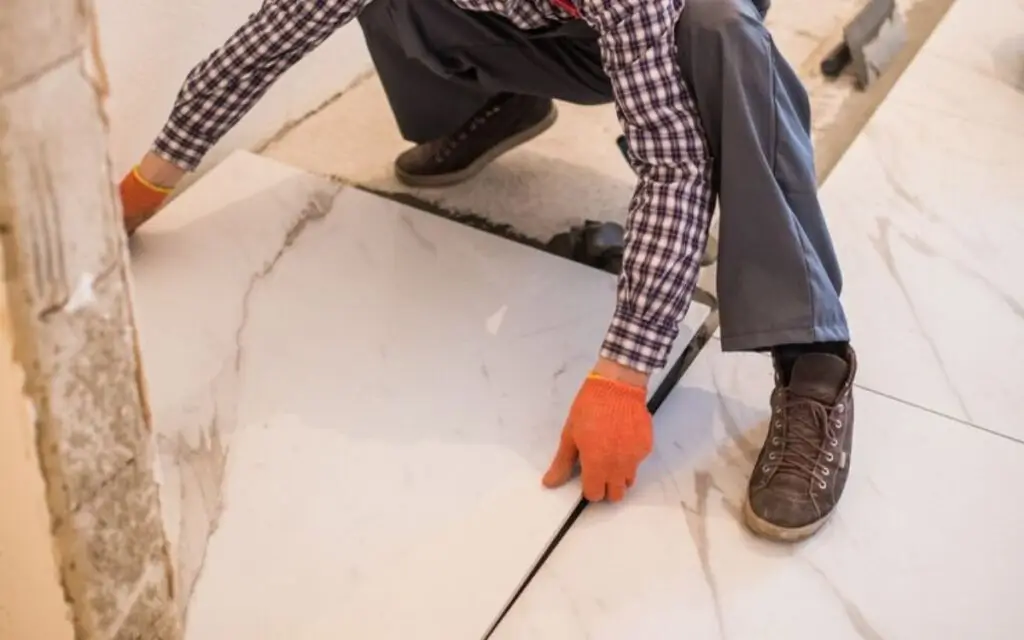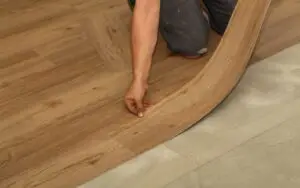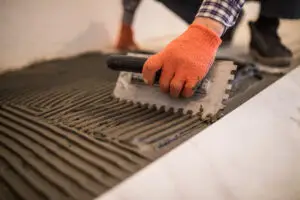Understanding Stone Tile Durability
Factors Affecting Stone Tile Lifespan
Type of Stone
The type of stone has a significant impact on its lifespan. Some stones, like granite and slate, are naturally more durable and resistant to wear, while others, like marble and limestone, are softer and may require more frequent maintenance. It is essential to know the properties of your stone, and whether it requires more maintenance to ensure that it lasts a long time.
Installation Quality
Proper installation is crucial for maximizing the lifespan of stone tile flooring. A poorly installed floor is more prone to cracking, shifting, and moisture damage, which can all significantly reduce its longevity. Professional installers are experts in all types of stone tile and will always follow industry best practices to ensure a long-lasting and durable floor.
Maintenance and Care
Regular maintenance and care will help extend the life of your stone tile floors, and ensure they continue to look their best for many years to come. This includes sweeping, mopping, and sealing the floors, as well as promptly cleaning up any spills, or messes, to prevent staining. Some types of stone require more maintenance than others, which is why it is always important to discuss your flooring options with a professional installer, to make sure that you are prepared for any required maintenance.
Traffic Levels
The amount of foot traffic will also have a direct impact on the lifespan of your stone tile flooring. High-traffic areas, will generally require more durable materials, and more frequent maintenance, to help them withstand all of the wear and tear. High-traffic areas may also require you to replace the floors sooner than other areas of your home.
Lifespan of Different Stone Tiles
Granite
Granite is known for its exceptional durability and longevity, and can easily last for 100 years or more, with proper care. It is one of the most durable flooring materials that is available, and it is a great option for both homes and businesses, and can withstand heavy foot traffic, without any issues.
Marble
Marble is also very durable, and can last for many decades with proper maintenance, which includes regular cleaning, and sealing. The lifespan of marble depends on how well it is maintained and the amount of foot traffic it receives. It is always wise to ask a professional installer about which maintenance steps you will need to take, to ensure that your marble floors last for as long as possible.
Limestone
Limestone is a softer stone than granite, and is also more susceptible to scratching, and staining. However, it is still a very durable option, and can last for many decades, if it is properly sealed and cleaned. It is essential to use the correct cleaning products that will protect the integrity of the stone, and prevent any long-term damage.
Travertine
Travertine is another durable stone option, and it can last for many decades, when properly maintained. Like limestone, it requires regular sealing, and protection from scratches, and stains. It is also a good idea to avoid using abrasive cleaners that can damage the surface of the stone. Professional installers are highly skilled in travertine installation, and will always provide you with the specific steps that you should take to extend the life of your travertine floors.
Slate
Slate is a very durable stone that is known for its resistance to water, staining, and cracking, and is also an excellent choice for areas that are more prone to getting wet, such as bathrooms, and mudrooms. When properly maintained, slate floors can easily last for 75 years or more, and will continue to look great with the proper care, and maintenance techniques.
Maximizing Stone Tile Longevity
Proper Installation Techniques
Subfloor Preparation
Proper subfloor preparation is an essential step to ensuring that your stone tile floors will last for as long as possible. The subfloor should be level, clean, and free of any moisture. If the subfloor is not properly prepared, it can lead to problems with the installation, such as cracking, shifting, and moisture damage. Professional installers are well versed in all steps of subfloor preparation, and they can ensure that this is completed correctly, the first time.
Setting the Tiles
Setting the tiles properly is also a crucial step for ensuring the longevity of stone tile flooring. The tiles should be laid evenly, and with proper spacing. The adhesive that is used should also be high-quality, and it should be applied correctly, to provide a strong bond between the tiles and the subfloor. Professional installers will always ensure that all of these steps are followed, and that the tiles are installed correctly for maximum durability.
Grouting and Sealing
Proper grouting, and sealing, will help protect your stone tile floors from moisture, stains, and other types of damage. High-quality grout should be used, and it should be applied carefully, to ensure it is even and smooth. The sealant should also be applied properly, and should be reapplied on a regular basis, as directed by the manufacturer. Professional installers can advise you on the best products to use, and they can also perform these services for you, for maximum protection.
Regular Maintenance and Care
Cleaning Practices
Regular cleaning is essential for keeping your stone tile floors looking their best, and can also help extend their lifespan. You should sweep, or vacuum the floors regularly, to remove any dirt, dust, or debris. It is also important to mop the floors regularly, using a mild soap, and water. You should always avoid using any harsh chemicals, or abrasive cleaners, as these can damage the surface of the stone.
Sealing Frequency
The frequency with which you seal your stone tile floors, will depend on the type of stone, and the amount of traffic it receives. Softer stones, such as marble, and limestone, may require sealing every 1-2 years, while harder stones, such as granite, and slate, may only need to be sealed every 3-5 years. It is also important to use a high-quality sealer, that is designed for your specific type of stone. Professional installers can always advise you on all of these steps, and they will also be able to perform the sealing for you, if desired.
Repairing Damage
Promptly repairing any damage to your stone tile flooring, will help to prevent further issues, and will also extend its lifespan. Cracks, chips, and stains, should be addressed immediately, and you may need to contact a professional installer, to make any necessary repairs. Addressing these issues quickly will prevent them from getting worse, and potentially causing permanent damage.
The Role of Professional Stone Flooring Services
Benefits of Professional Installation
Expertise and Precision
Hiring a professional stone flooring installer, will always provide you with expertise, and precision, that you simply cannot get with a DIY install. Professional installers are highly skilled in all aspects of stone tile flooring, and they will always use best practices, to ensure a long-lasting, and high-quality result. Their experience is invaluable, and will give you peace of mind that the job is done right the first time.
Specialized Tools and Techniques
Professional installers also have access to specialized tools, and techniques, that are not readily available to the general public. These tools will often allow them to complete the installation faster, and more efficiently, and with better overall results. This is one of the most significant benefits of hiring a professional installer, as they know how to use these types of tools to perfection.
Long-Term Maintenance and Support
Routine Maintenance
Professional stone flooring services can also provide routine maintenance services, that will help keep your floors looking their best, and can also help to extend their lifespan. These types of services will often include cleaning, sealing, and polishing. Professional installers will be able to assess the current condition of your floors, and advise you on the best course of action to protect your investment.
Damage Repair
Professional installers can also provide expert damage repair services, that can address any issues, such as cracks, chips, or stains. They will be able to determine the cause of the damage, and they will also be able to provide the best solution to fix it, and prevent it from getting worse.
DIY vs Professional Stone Tile Installation
Challenges of DIY Installation
Potential for Errors
DIY stone tile installation comes with a high potential for errors, such as improper subfloor preparation, inaccurate cuts, and incorrect grout application. These types of errors can lead to an unprofessional result, and can also require costly rework, or repairs, down the road. Professional installers have the expertise, and knowledge, to avoid all of these types of errors.
Time and Effort
DIY installation is also a very time consuming and labor-intensive process, which can take much longer than anticipated, and can also lead to physical strain, and injuries. Stone tile installation requires a high degree of skill and precision, and should often be left for the professionals, to ensure a smooth, efficient, and safe installation process.
Benefits of Professional Installation
Guaranteed Quality
Professional stone flooring services will always guarantee the quality of their work, and will always be committed to your satisfaction. They will also stand behind their work, and offer a warranty, which will protect you from any unexpected problems, or issues, that might arise after the installation is completed.
Warranty Protection
Professional flooring services often offer a warranty that covers both the labor and the materials used in the project, and can offer a great deal of peace of mind, that you simply cannot get with DIY projects. With a warranty, you know that you are protected, and that your investment will last for many years to come.
Case Studies: Stone Tile Longevity
Example of Properly Maintained Stone
A homeowner installed granite flooring in their kitchen. They hired a professional installer, and followed all of the recommended cleaning and maintenance practices. After 20 years, the granite still looked great, and showed minimal signs of wear. This shows the importance of proper installation, and routine maintenance.
Example of Neglected Stone
Another homeowner attempted to install limestone flooring themselves, and did not seal the floors, or follow the proper cleaning and maintenance procedures. After just a few years, the limestone became stained, scratched, and looked worn and unattractive. This clearly illustrates how not following the proper procedures, can greatly reduce the lifespan of your new stone floors.
FAQs & Answers
With proper installation and maintenance, stone tile flooring can last for decades, and even a lifetime. The lifespan will depend on the type of stone, the amount of traffic it receives, and the care it receives. Professional installers can provide expert advice on these steps to ensure your stone tile floors will last for as long as possible.
Granite and slate are known for their exceptional durability, which will make them last for a long time, even in high traffic areas. Marble, limestone, and travertine, are also very durable, but may require more frequent maintenance. Professional installers can help you choose the best type of stone for your needs, and lifestyle, and will also guarantee their work.
The most important steps you can take to extend the life of your stone tile floors include proper installation, regular cleaning, sealing, and prompt repairs of any damage. You should always use cleaners that are specifically designed for your type of stone, and you should also avoid using any harsh chemicals, or abrasive cleaners, as these can damage the stone, and make it look dull. Professional installers can help you to choose all of the right materials, and to perform the best techniques to ensure that your floors always look their best.
Professional stone flooring installation services have the expertise, experience, and tools needed to ensure that your floors last as long as possible. They will ensure that your subfloor is prepared correctly, that the tiles are laid properly, and that the grout and sealer, are applied professionally, which will ensure that your stone floors will last for many years to come. These services are also often backed by a guarantee, which will give you added peace of mind.
Warning signs that your stone tile flooring needs professional attention include cracks, chips, or discoloration on your stone, loose or crumbling grout, or any signs of moisture damage. If you see any of these signs, you should contact a professional installer as soon as possible, to avoid any further damage, and to address the underlying issues before they become more serious.





